March 31, 1945: A secret codicil (kept secret for over 50 years) to the Yalta agreement is completed. Stalin agrees that as the Russians liberate POW camps in Germany, American and British POWs will be turned over to the American and British forces. Likewise, as the Americans and British liberate German POW camps, Russian POWs will, in all cases, be returned to Russia. Unfortunately, while American and British POWs want to return to their own forces, Russian POWs, in the main, do not want to return to Russia because they know what awaits them. Stalin has made it clear that he considers Russian prisoners traitors to communism. Death or exile will be their fate. FDR and Churchill, aware of these facts, agree anyway; it is hard to see how they could do otherwise without running the risk of having their own troops become virtual hostages. Note: This is one of the events collectively referred to by some as the 'Allied Holocaust.' Ultimately, two million Soviet citizens will be sent back to the communists where they will either be immediately executed or sent to die in the Gulag. (Harriman)
Averell Harriman will later recall: Our officers were thinking of the welfare of our own prisoners, some seventy-five thousand men, who without exception could not get home quickly enough. We had no idea that hundreds of thousands of the Soviet citizens would refuse because they had reason to suspect they would be sent to their deaths or to Beria's prison camps. That knowledge came later. (Harriman)
March 31, 1945 Churchill to Ismay:
I hope however we shall realize that we have only a quarter of the forces invading Germany, and that the situation has thus changed remarkably from the days of June 1944. It seems to me that the chief criticism of the new Eisenhower plan is that it shifts the axis of the main advance upon Berlin to the direction through Leipzig to Dresden, and thus raises the question of whether the Twenty-first Army Group will not be so stretched as to lose its offensive power, especially after it has been deprived of the Ninth United States Army. Thus we might be condemned to a static role in the north and virtually prevented from crossing the Elbe until an altogether later stage in the operations has been reached. All prospect also of the British entering Berlin with the Americans is ruled out.
It also seems that General Eisenhower may be wrong in supposing Berlin to be largely devoid of military and political importance. Even though German Government departments have to a great extent moved to the south, the dominating fact on German minds of the fall of Berlin should not be overlooked. The idea of neglecting Berlin and leaving it to the Russians to take at a later stage does not appear to me to be correct. As long as Berlin holds out and withstands a siege in the ruins, as it may easily do, German resistance will be stimulated. The fall of Berlin might cause nearly all Germans to despair. (Churchill)
March 31: 1945 Churchill to Eisenhower:
I do not know why it would be an advantage not to cross the Elbe. If the enemies' resistance should weaken, as you evidently expect and which may be fulfilled, why should we not cross the Elbe and advance as far east as possible? This has an important political bearing, as the Russian armies of the South seem certain to enter Vienna and overrun Austria. If we deliberately leave Berlin to them, even if it should be in our grasp, the double event may strengthen their conviction, already apparent, that they have done everything. (Churchill)
April 1, 1945 Eleanor Roosevelt to Maude Gray:
FDR with whom I talked today seems settled in Warm Springs & the rest will do him good. He should gain weight but he hates his food. I say a prayer daily that he may be able to carry on till we have peace & our feet are set in the right direction ...
Elliot cables that he hopes the end will come soon in Germany. The boys in the Pacific are not so optimistic. All three are there now & I suppose in this battle I can't help worrying about them all, they've been in so long, will their luck hold. (Nash II)
April 1, 1945: The final Allied offensive in Italy begins as Seyss-Inquart and Speer meet secretly to co-ordinate anti-scorched-earth measures. (Speer)
From Hitler, A Study in Tyranny by Alan Bullock: Hitler had lost all control over events, and by April he had the greatest difficulty in discovering what was happening. The Germans went on fighting—in the east with the courage of despair—but there was no longer any organized direction of the war. This is amply confirmed by such records as survive of the conferences Hitler held from the beginning of January onwards. Once the operations in the Ardennes had failed, all sense of purpose was lost. The discussions of the military situation in the early months of 1945 are rambling, confused, and futile. The leadership was not only morally, but intellectually, bankrupt. Hours were wasted in discussions of detail and local operations, interrupted by reminiscences and recriminations. Hitler no longer showed any grasp of the situation. His orders became wilder and more contradictory, his demands more impossible, his decisions more arbitrary. His one answer to every proposal was: No withdrawal."
April 1, 1945 Churchill to Stalin:
If our efforts to reach an agreement about Poland are to be doomed to failure I shall be bound to confess the fact to Parliament when they return from Easter recess. No one has pleaded the cause of Russia with more fever or conviction than I have tried to do. I was the first to raise my voice on June 22, 1941. It is more than a year since I proclaimed to a startled world the justice of the Curzon Line for Russia's western frontier, and this frontier has now been accepted by both the British Parliament and the President of the United States.
It is as a sincere friend of Russia that I make my personal appeal to you and to your colleagues to come to a good understanding about Poland with the Western democracies, and not to smite down the hands of comradeship in the future guidance of the world which we now extend.
April 1, 1945 Eisenhower to Churchill:
I had never lost sight of the great importance of the drive to the northernmost coast, although your telegram did introduce a new idea respecting the political importance of the early attainment of particular objectives. I clearly see your point in this matter. The only difference between your suggestions and my plan is timing. In order to assure the success of each of my planned efforts, I concentrate first in the Center to gain the position I need.
As it looks to me now, the next move thereafter should be to have Montgomery cross the Elbe, reinforced as necessary by American troops, and reach at least a line including Luebeck, on the coast. If German resistance from now on should progressively and definitely crumble you can see that there would be little if any difference in time between gaining central position and crossing the Elbe.
On the other hand, if resistance tends to stiffen at all I can see that it is vitally necessary that I concentrate for each effort, and do not allow myself to be dispersed by attempting to do all these projects at once. Quite naturally, if at any moment collapse should suddenly come about everywhere along the front we would push forward, and Luebeck and Berlin would be included in our important targets. (Churchill)

April 2, 1945 Churchill to Eisenhower:
I am however all the more impressed with the importance of entering Berlin, which may well be open to us, by the reply from Moscow to you, which in paragraph 3 says, "Berlin has lost its former strategic importance." This should be read in the light of what I mentioned of the political aspects. I deem it highly important that we should shake hands with the Russians as far to the east as possible. (Churchill)
April 3, 1945 Stalin to FDR:
I have received your message on the question of negotiations in Berne. You are absolutely right that, in connection with the affair regarding negotiations of the Anglo-American command with the German command somewhere in Berne or some other place, there has developed an atmosphere of fear and distrust deserving regrets. You insist there have been no negotiations yet. It may be assumed that you have not yet been fully informed. As regards my military colleagues, they, on the basis of data which they have on hand, do not have any doubts that the negotiations have taken place, and that they have ended with an agreement with the Germans, on the basis of which the German commander on the Western Front, Marshal Kesselring, has agreed to open the front and permit the Anglo-American troops to advance to the east, and the Anglo-Americans have promised in return to ease for the Germans the peace terms. I think that my colleagues are close to the truth. Otherwise one could not have understood the fact that the Anglo-Americans have refused to admit to Berne representatives of the Soviet command for participation in the negotiations with the Germans.
I also cannot understand the silence of the British, who have allowed you to correspond with me on this unpleasant matter, and they themselves remain silent, although it is known that the initiative in this whole affair with the negotiations in Berne belongs to the British. I understand that there are certain advantages for the Anglo-American troops as a result of these separate negotiations in Berne or some other place, since the Anglo-American troops get the possibility to advance into the heart of Germany almost without resistance on the part of the Germans, but why was it necessary to conceal this from the Russians, and why were your Allies, the Russians, not notified? As a result of this at the present moment the Germans on the Western Front in fact have ceased the war against England and the United States. At the same time the Germans continue the war with Russia, the Ally of England and the United States. It is understandable that such a situation can in no way serve the cause of preservation of the strengthening of trust between our countries. I personally and my colleagues would never have made such a risky step, being aware that a momentary advantage, no matter what it would be, is fading before the principal advantage of the preservation and strengthening of the trust among the Allies. (Churchill)

April 3, 1945 From Gauleiter Uiberreither to Speer:
Concerning Fuehrer's orders of March 19, I request detailed instructions as to which armament plants in my Gau are not to be destroyed under any circumstances. Since the military situation is completely fluid, a surprise enemy breakthrough can be expected at any moment ... The fate of the armaments plants in upper Styria should be determined on the basis of the military situation in the Lower Danube region, but I have no information about that. Should the hydroelectric or steam power plants on the Drau and the Mur be destroyed before they can fall into the hands of the enemy undamaged? Your guidelines are only partly applicable here, since there is no definite front line ... (Speer)
April 3, 1945 From Speer to Gauleiter Uiberreither:
According to the Fuehrer's orders of March 30, 1945 there is to be no scorched earth. All installations and plants should be crippled so that the enemy will derive no additional military potential from them. In almost every case expert crippling by engineers will be sufficient and will fulfill the conditions stipulated by the Fuehrer. This applies to the plants mentioned in your cable. The Fuehrer's order of March 30, 1945, was intended to eliminate the varied interpretations that could be attached to the order of March 19, 1945, and to establish his unequivocal commitment to the method of crippling. Destruction is therefore permissible only if crippling would not achieve the desired effect. In addition the Fuehrer proclaims: Work until the last possible moment. Power plants are to be crippled only."
April 4, 1945: Hungary is liberated from Nazi occupation: Now a Hungarian National Day. In the West, Kassel, Germany, is taken by troops from Patton's Third Army as American troops discover mass graves in Ohrdruf.
April 4, 1945 Goebbels Diary:
Again a mass of new decrees and orders pour in from Bormann. Bormann has made a paper chancellery out of the Party Chancellery. Every day he sends out a mountain of letters and files which Gauleiter at present in the midst of the struggle can in practice not even read. In part, it's a matter of completely useless stuff of no value for the practical struggle. (Kershaw)
April 5, 1945: Yugoslav leader Josip 'Tito' Broz signs an agreement with the USSR allowing for the "temporary entry of Soviet troops into Yugoslav territory." Meanwhile, Molotov informs the Japanese Ambassador in Moscow that the Soviet Union hereby denounces its 1941 non-aggression pact with Japan.
April 5, 1945 FDR to Stalin:
I have received with astonishment your message of April 3 containing an allegation that arrangements which were made between Field-Marshal Alexander and Kesselring at Berne permitted the Anglo-American troops to advance to the east, and the Anglo-Americans promised in return to ease for the Germans the peace terms.
In my previous messages to you in regard to the attempts made in Berne to arrange a conference to discuss surrender of the German Army in Italy I have told you that (i) no negotiations were held in Berne; (ii) that the meeting had no political implications whatever; (iii) that in any surrender of the enemy Army in Italy there could be no violation of our agreed policy of unconditional surrender; (iv) that Soviet officers would be welcomed at any meeting that might be arranged to discuss surrender. For the advantage of our common war effort against Germany, which today gives the promise of an early success in a disintegration of the German armies, I must continue to assume that you have the same high confidence in my truthfulness and reliability that I have always had in yours. I have also a full appreciation of the effect your gallant Army has had in making possible a crossing of the Rhine by the forces under General Eisenhower, and the effect that your forces will have hereafter on the eventual collapse of the German resistance to our combined attacks.
Our advances on the Western Front are due to military action. Their speed has been attributable mainly to the terrific impact of air-power, resulting in destruction of German communications, and to the fact that Eisenhower was able to cripple the bulk of the German forces on the Western Front while they were still west of the Rhine. I am certain that there were no negotiations in Berne at any time, and I feel that your information to that effect must have come from German sources, which have made persistent efforts to create dissention between us in order to escape in some measure responsibility for their war crimes. Frankly, I cannot avoid a feeling of bitter resentment toward your informers, whoever they are, for such vile misrepresentations of my actions or those of my trusted subordinates. (Churchill)
April 5, 1945 Churchill to FDR:
I am astounded that Stalin should have addressed to you a message so insulting to the honor of the United States and also of Great Britain. His Majesty's Government cordially associate themselves with your reply. There is little doubt in my mind that the Soviet leaders, whoever they may be, are surprised and disconcerted at the rapid advance of the Allied armies in the West and the almost total defeat of the enemy on our front, especially as they say they are themselves in no position to deliver a decisive attack before the middle of May. All this makes it the more important that we should join hands with the Russian armies as far to the east as possible, and, if circumstances allow, enter Berlin. I deem it of the highest importance that a firm and blunt stand should be made at this juncture by our two countries in order that the air may be cleared and they realize that there is a point beyond which we will not tolerate insult. I believe this is the best chance of saving the future. If they are ever convinced that we are afraid of them and can be bullied into submission, then indeed I should despair of our future relations with them and much else. (Churchill)
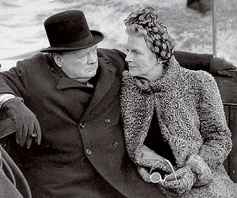
April 6, 1945 Churchill writes to his wife, Clementine:
The only times I ever quarrel with the Americans are when they fail to give us a fair share of opportunity to win glory. Undoubtedly I feel much pain when I see our armies so much smaller than theirs. It has always been my wish to stay equal, but how can you do that against so mighty a nation and a population nearly three times your own? (Meacham)
April 6, 1945: Speer moves his family to an estate near Kappeln in Holstein, soon to be in the British occupation zone. (Speer)
From Albert Speer: His Battle with Truth, by Gitta Sereny: In early April, Hitler's surgeon Dr. Brandt had evacuated his wife and child to Thuringia, where the arrival of the British was imminent. When (Eva) Braun quite innocently told Hitler, he thundered to her horror that this was treason, and ordered that Brandt be court-marshaled and sentenced to death. Speer wrote in Spandau: 'We were appalled. Johanna Wolf, who had been his senior secretary for twenty years, sobbed, 'I don't understand him any longer.' Luckily, there was a missing witness and Brandt's execution was put off awaiting his return. Himmler - of all people - assured me privately that this witness 'would not be found.'' Speer had his own problem with this. A few days before, probably just about when Brandt moved his family away from Berchtesgaden, he had done the same. Now it was a crime. Hitler, he knew, intended to divide the country into two commands, with Field Marshal Kesselring in charge of the southern half and Admiral Doenitz the north. 'I had a terrible feeling that even if he did finally decide to go south rather than stay in Berlin, he would create a Goetteraemmerrung at the Berghof,' Speer told me. 'So I had been determined to get the family north, to the potential British zone and Doenitz's sensible command sector, but it wasn't easy. Eva Braun asked me every day where they were.'
April 6, 1945 Churchill to Stalin:
There is however the possibility that the whole of this request to parley by the German General Wolff was one of those attempts which are made by the enemy with the object of sowing distrust between Allies; it has certainly for the moment been successful. In the interests of Anglo-Russian relations His Majesty's Government decided not to make any reply to this most wounding and unfounded charge, but to ignore it. This is the reason for what you call in your message to the President 'the silence of the British.' We thought it better to keep silent than to respond to such a message. I associate myself and my colleagues with the last sentence of the Presidents reply." (Churchill)
April 7, 1945 Stalin to FDR:
1. In the course of our correspondence it has become evident that our views differ on the point as to what is admissible and what is inadmissible as between one ally and another. We Russians think that in the present situation on the fronts, when the enemy is faced with inevitable surrender, if the representatives of any one ally ever meet the Germans to discuss surrender the representatives of another ally should be afforded an opportunity of participating in such a meeting. I still think the Russian point of view to be the only correct one, as it precludes all possibility of mutual suspicions and makes it impossible for the enemy to sow distrust between us.
2. It is difficult to admit that the lack of resistance by the Germans on the Western Front is due solely to the fact that they have been defeated. The Germans have 147 divisions on the Eastern Front. They could without prejudicing their own position detach fifteen or twenty divisions from the Eastern Front and transfer them to reinforce their troops on the Western Front. Yet the Germans have not done and are not doing this. They are continuing to wage a crazy struggle with the Russians for an insignificant railway station like Zemlyanitsa in Czechoslovakia, which is as much use to them as hot poultices to a corpse, and yet they yield without resistance such important towns in the center of Germany as Osnabruck, Mannheim, and Kassel. You will agree that such behavior on the part of the Germans is more than curious and unintelligible.
3. As regards my informants, I can assure you that they are extremely honest and modest people who discharge their duties conscientiously and have no intention of offending anyone. (Churchill)

April 7, 1945 Stalin to Churchill:
My messages are personal and strictly confidential. This makes it possible to speak one's mind clearly and frankly. This is the advantage of confidential communications. If however you are going to regard every frank statement of mine as offensive it will make this kind of communication very difficult. I can assure you that I had no intention of offending anyone. You wonder why the Polish theatre of military operations must be wrapped in mystery. In fact there is no mystery here. You ignore the fact that if British observers or other foreign observers were sent into Poland the Poles would regard this as an insult to their national dignity, bearing in mind the fact moreover that the present attitude of the British Government to the Provisional Polish Government is regarded as unfriendly by the latter.
So far as the Soviet Government is concerned, it cannot but take into account the negative attitude of the Provisional Government to the question of sending foreign observers into Poland. Further, you are aware that the Polish Provisional Government puts no obstacles in the way of entrance into Poland by representatives of other States which take up a different attitude towards it, and does not in any way obstruct them. This is the case, for instance, in regard to representatives of the Czechoslovak Government, the Yugoslav Government, and others. I had an agreeable conversation with Mrs. Churchill, who made a great impression on me. She gave me a present from you. Allow me to express my heartfelt thanks for this present. (Churchill)
April 7, 1945: Visoko is liberated by Yugoslav Partisan forces.
April 8, 1945: Goebbels maintains that the Allies are in as bad a shape as Germany, and if Germany can just hold out a little longer, the enemy will collapse:
Under the fury of the enemy offensives that have been pressing down on our fronts to the west, east, and south for months, as well as the almost unceasing bombing of our German cities and provinces, some hearts are beginning to shake and tremble. Rarely in history has a brave people struggling for its life faced such terrible tests as the German people have in this war. The misery that results for us all, the never ending chain of sorrows, fears, and spiritual torture does not need to be described in detail. We know them all too well, and we are too proud to appeal to the world's pity. We are bearing a heavy fate because we are fighting for a good cause, and are called to bravely endure the battle to achieve greatness.
This faith is the sure foundation that remains to us in the midst of this inferno of self destruction under which all humanity moans and weeps. That is why we cling so strongly to it, for if we lost it, we ourselves would also be lost. It may be a consolation for experienced hearts to know that this sorrow will end, as do all of earth's sorrows. The question is how that end will come. A happy outcome for us depends wholly and exclusively on ourselves. We must earn it. Just as we have done again and again in such admirable ways in the earlier stages of this terrible war, our goal must be not to lack those proven virtues of war in the final phase of this gigantic battle between peoples. The darkest hour is the one before sunrise. The stars that lent their soft light have already set, and the deepest darkness precedes the dawn. No one needs to fear that it will forget to come. The dark veil of night will suddenly fall and the sun will rise in the blood-red sky. As it is in nature, so to it is in the lives of peoples and nations, particularly during war, which is the most terrible natural event among peoples and nations. Have confidence and wait until
that hour comes ...
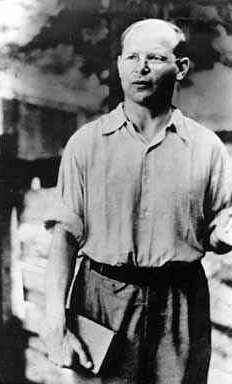
April 8, 1945: German theologian and martyr Dietrich Boenhoeffer, the night before he is hanged by the Nazis, declares: 'This is the end—for me the beginning'—his last recorded words.
April 9, 1945: Churchill, according to the minutes of a meeting of the British War Cabinet, "said that he hoped the day of the celebrations would be known as VE-day." (Meacham)
April 9, 1945: Admiral Wilhelm Canaris, former head of the Abwehr, General Hans Oster (above, right), and Pastor Dietrich Boenhoeffer, are hanged at Flossenburg concentration camp.
April 9, 1945: The Germans begin evacuating Mauthausen concentration camp as Nordhausen and Dora-Mittelbau (Dora-Nordhausen)—where thousands of slave laborers have already died in the underground V-2 plants—is liberated by the Americans.
April 9, 1945: The German pocket battleship Admiral Scheer—the most successful capital ship commerce raider of the war—is bombed and sent to the bottom by the RAF while docked in Kiel.
April 9, 1945: The Battle of Koenigsberg, in East Prussia, ends. The Soviets will soon begin what will be their fastest Front redeployment of the war, and by the 16th they will be poised to launch their final push on Berlin. (Bullock)
April 10, 1945 From the diary of Margaret 'Daisy' Suckley (FDR's distant cousin and close friend):
Another beautiful, warm day. F (FDR) had his usual morning, with me reading the paper by his window, while he had his breakfast (and) read all the war dispatches in 2 or 3 papers. He has the whole western front in Europe in his head, knows exactly where each army is at any moment. He says he has to, for sometimes he has to make decisions about operations.. I was surprised at this, thinking that Eisenhower would have the final say about such things, but F explained it this way: Some time ago, Eisenhower made a forward movement in the southern part of the line. Winston Churchill promptly cabled F a protest... F, knowing what the plans were, sent an explanation to W.S.C. backing up Eisenhower. (Meacham)
April 10, 1945: Medics of the US 3rd Armored Division report that they have discovered Nordhausen Death Camp on the way to Camp Dora. In the two adjacent camps they discover 5,000 corpses. 1,200 patients are soon evacuated, with 15 dying on their way to the hospital area and another 300 subsequently dying of malnutrition. The American Third Army liberates the prison camp at Buchenwald, where nearly 57,000 prisoners (mostly Jews) had perished. (Sellier)
April 11, 1945 From a speech by Admiral Doenitz:
Only the Fuehrer has for years realized with what danger Bolshevism threatens Europe. Perhaps even this year, Europe will realize that Adolf Hitler is the only statesman of stature in Europe. Europe's blindness will one day come to a sudden end and thereby bring Germany's psychological help and political possibilities arising therefrom ...
From Doenitz's IMT Testimony: In the spring of 1945 I was not head of the State; I was a soldier. To continue the fight or not to continue the fight was a political decision The head of the State wanted to continue the fight. I as a soldier had to obey. It is an impossibility that in a state one soldier should declare, "I shall continue to fight," while another declares, "I shall not continue the fight." I could not have given any other advice, the way I saw things; and for the following reasons: First: In the East the collapse of our front at one point meant the extermination of the people living behind that front. We knew that because of practical experiences and because of all the reports which we had about this. It was the belief of all the people that the soldier in the East had to do his military duty in these hard months of the war, these last hard months of the war. This was especially important because otherwise German women and children would have perished. The Navy was involved to a considerable extent in the East. It had about 100,000 men on land, and the entire surface craft were concentrated in the Baltic for the transport of troops, weapons, wounded, and above all, refugees. Therefore the very existence of the German people in this last hard period depended above all on the soldiers carrying on tenaciously to the end.
Secondly: If we had capitulated in the first few months of the spring or in the winter of 1945, then from everything we knew about the enemy's intentions the country would, according to the Yalta Agreement, have been ruinously torn asunder and partitioned and the German land occupied in the same way as it is today. Thirdly: Capitulation means that the army, the soldiers, stay where they are and become prisoners. That means that if we had capitulated in January or February 1945, 2 million soldiers in the East, for example, would have fallen into the hands of the Russians. That these millions could not possibly have been cared for during the cold winter is obvious; and we would have lost men on a very large scale, for even at the time of the capitulation in May 1945-that is, in the late spring-it was not possible in the West to take care of the large masses of prisoners according to the Geneva Convention. Then, as I have already said, since the Yalta Agreement would have been put into effect, we would have lost in the East a much larger number of people who had not yet fled from there.
April 12, 1945 FDR to Stalin:
Thank you for your frank explanation of the Soviet point of view of the Berne incident, which now appears to have faded into the past without having accomplished any useful purpose. There must not, in any event, be mutual distrust, and minor misunderstandings of this character should not arise in the future. I feel sure that when our armies make contact in Germany and join in a fully coordinated offensive the Nazi armies will disintegrate. (Churchill)
April 12, 1945 FDR to Churchill:
I would minimize the general Soviet problem as much as possible, because these problems, in one form or another, seem to arise every day, and most of them straighten out, as in the case of the Berne meeting. We must be firm however, and our course thus far is correct." (Note: The wartime communications presented here are dated the day they were received, not the often different day that they were actually sent.) (Churchill)
April 12, 1945 Death: Franklin Delano Roosevelt, the longest serving president in American history, of a cerebral hemorrhage (3:45 PM) in Warm Springs, Georgia, three months into his fourth term and less than one month before the surrender of Germany.
From Franklin and Winston: An Intimate Portrait of an Epic Friendship, by Jon Meacham: Eleanor (Roosevelt) was called to the telephone. It was Steve Early, asking her to return to the White House. Ever dutiful, Eleanor said her good-byes at the party and then sat, she recalled, 'with clenched hands' as she was driven home. 'I knew down in my heart that something dreadful had happened... Steve Early broke the news to Eleanor at the White House. She sent a telegram to her sons, all of whom were overseas. 'Father slept away. He would expect you to carry on and finish your jobs.' The Other Club had adjourned. Churchill was in the Annexe. 'I am very glad your visit to Leningrad was so pleasant and interesting,' he was writing to Clementine. 'Here everything is quiet except politics. Love.'
Then came a call from Washington with the news from Warm Springs. 'I felt as if I had been struck a physical blow,' Churchill recalled. The long courtship, with its joys and frustrations, had come to an end. 'I have just heard the grievous news of President Roosevelt's death,' he added to the cable to Clementine. He had been writing to Mary, too, who had just been decorated for her service in antiaircraft batteries in northwest Europe. Telling her the news in a postscript, Churchill noted: 'You know how this will hit me.' It was late, too late to do much, but Churchill discharged his duties. 'Get me the palace,' he said to an aide, and Churchill briefed the king's private secretary, who told George 6th. In the night, Churchill cabled Lord Halifax in Washington to ask if he might come to the funeral.
April 12, 1945: Field Marshal Kesselring meets with Hitler for the last time. He will later record that Hitler "...was still optimistic. How far he was play-acting it is hard to decide. Looking back, I am inclined to think that he was literally obsessed with the idea of some miraculous salvation, that he clung to it like a drowning man to a straw." (Kershaw)
From Eleanor and Franklin, by Joseph P. Lash: The vice president, who did not know why he had been summoned to the White House so urgently, soon arrived and was ushered into Eleanor's sitting room...Eleanor came forward and placed her arm gently on the vice presidents shoulder. 'Harry,' she said quietly, 'the President is dead.' For a moment a stunned Truman could not bring himself to speak. Finally, finding his voice, he asked, 'Is there anything I can do for you? He would never forget, he later wrote, her 'deeply understanding' reply. 'Is there anything we can do for you?' she asked. 'For you are the one in trouble now.' As the arrangements went forward to swear in the vice president, he asked Eleanor whether there was anything she needed to have done. She told him she would like to go to Warm Springs at once and asked if it would be proper for her to make use of a government plane. He agreed immediately, and minutes after the new president was sworn in, she left for Warm Springs.

April 12, 1945: Vice President Harry S. Truman is sworn in as the 33rd President of the United States. Shortly after taking the oath of office, Truman tells a group of reporters:
Boys, if you ever pray, pray for me now. I don't know if you fellas ever had a load of hay fall on you, but when they told me what happened...I felt like the moon, the stars, and all the planets had fallen on me. (McCullough)
From In the Shadow of FDR, by William E. Leuchtenburg: In the eighty-two days he was vice-president, Truman had so little contact with Roosevelt that he cannot be said to have received any tutelage at all. 'I don't think I saw him but twice as Vice President except at Cabinet meetings,' Truman subsequently acknowledged. Not once did he see inside the map room at the White House, where battle strategy was reviewed, and Roosevelt failed to keep him abreast of diplomatic developments for he was viewed as far too insignificant a subaltern to be trusted with secrets of state. (Roosevelt appears never to have entertained seriously the possibility that he would die.) When Roosevelt went to Yalta, he informed the vice-president that he could send dispatches via the map room only if they were 'absolutely urgent'; and if Truman's messages ran too long, the map room officer would have the discretion to refuse to radio them. A week before FDR's death, the vice-president was reduced to writing, 'Hate to bother you but I have a suggestion to make.'
As Truman later told his daughter, 'He never did talk to me confidentially about the war, or about foreign affairs or what he had in mind for peace after the war.' Incredibly, Truman never even met the secretary of state, Edward R. Stettinius, Jr... A single episode at the end of his first cabinet meeting reveals how poorly informed Truman actually had been during his apprenticeship. As cabinet members filed out, Secretary of War Henry Stimson moved to the chair next to Truman's. When they were alone, Stimson confided that the government had been working secretly on an explosive of 'exceptional force' that no one in Congress knew about. That is all that the man Franklin Roosevelt had appointed to the cabinet felt free to tell the president of the United States at that time. Truman did not even grasp that Stimson was talking about the atomic bomb. On the following day the president learned a bit more, but nearly two weeks would go by before Stimson spelled out in detail what was happening, and Truman still appears to have been kept in ignorance of the meaning of the phrase 'Manhattan Project' more than a month after he succeeded FDR.
April 13, 1945 Churchill to Mrs. Eleanor Roosevelt:
Accept my most profound sympathy in your grievous loss, which is also the loss of the British nation and of the cause of freedom in every land. I feel so deeply for you all. As for myself, I have lost a dear and cherished friendship which was forged in the fire of war. I trust you may find consolation in the magnitude of his work and the glory of his name." (Churchill)

From The Cold War and its Origins, by D. F. Fleming: Just before Roosevelt died on April 12, 1945, he had prepared a radio address to be given the next day to celebrate Jefferson's birthday. In it he had written that 'the mere conquest of our enemies is not enough. We must go on to do all in our power to conquer the doubts and the fears, the ignorance and the greed, which made this horror possible.' Urging that an end be put 'forever, to this impractical, unrealistic settlement of the differences between peoples by the mass killings of peoples,' he asked the American people to 'keep your faith. I measure the sound, solid achievement that can be made at this time by the straight-edge of your own confidence and your resolve.' Then in his last words to us Roosevelt said: 'The only limit to our realization of tomorrow will be our doubts of today. Let us move forward with strong and active faith.' This was the spirit in which Roosevelt faced the making of peace, on the last day of his life.
April 13, 1945 Churchill to Truman:
Pray accept from me the expression of my personal sympathy in the loss which you and the American nation have sustained in the death of our illustrious friend. I hope that I may be privileged to renew with you the intimate comradeship in the great cause we all serve that I enjoyed through these terrible years with him. I offer you my respectful good wishes as you step into the breach in the victorious lines of the United Nations." (Churchill)
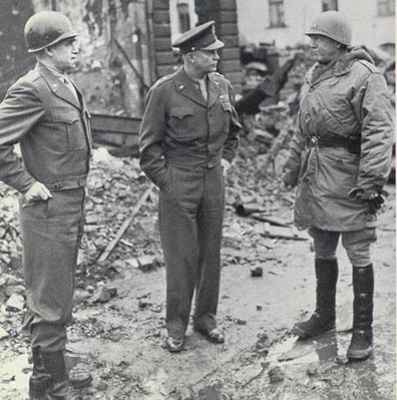
From Truman, by David McCullough: In a house at Marburg, Germany, three American generals, Eisenhower, Bradley, and Patton, sat up much of the night talking about Roosevelt and speculating on the sort of man Truman might be. All three were greatly depressed. 'From a distance Truman did not appear at all qualified to fill Roosevelt's large shoes,' Bradley wrote. Patton was bitter and more emphatic. 'It seems very unfortunate that in order to secure political preference, people are made Vice President who are never intended, neither by Party nor by the Lord to be Presidents.'
It had been an unusually difficult day for the three commanders, even before the news about Roosevelt. They had seen their first Nazi death camp, Ohrdorf-Nord, near Gotha. As they bid good night to one another, an aide recalled Eisenhower looking deeply shaken... There were some, however, who, facing the prospect of a Truman presidency, felt confident the country was in good hands. They knew the man, they said. They understood his origins. They had seen how he handled responsibility and knew the inner resources he could draw on. As before and later in his life, Harry Truman was greatest among those who knew him best.
April 13, 1945: Vienna, the first foreign capital to be occupied by Hitler, is liberated by the Russians under Fedor Tolbukhin. Meanwhile, American and British troops discontinue the march towards Berlin. The Soviets now have the road to Berlin to themselves.
April 13, 1945: German troops massacre 1,016 political and military prisoners at Gardelegen Germany. The Americans arrive at the site before the Germans have had the time to bury all of the bodies.
April 13, 1945: At the daily situation conference, a newly confident Hitler—whom Ribbentrop will later recall was 'in seventh heaven' this day with the news of FDR's death—announces that he has decided that the war will be won in Berlin, and he intends to stay in the city and direct the battle. He orders that units falling back from the Oder form a hard nucleus for the purpose of drawing the Soviet columns towards them, while the remaining German forces attack the columns from the sides. Most of his generals are sceptical, and a few try to talk him into moving to the relative safety of Berchtesgaden, but Hitler refuses to even consider it. He will make his last stand in Berlin. (Read)
April 13, 1945: Speer contacts the manager of the Berlin Philharmonic and tells him to change the program for the evening performance to include Wagner's Goetterdaemmerung. This is a signal to the groups' members that Speer will have transportation on hand after the performance to allow the 105 musicians to escape the fate Goebbels has planned for them; forced conscription in the Volkssturm. Speer has been planning this move to save the musicians for many weeks, but has been delaying it to allow the orchestra to continue their regular performances as a morale booster to the war-weary populace.
The plan is set in motion when Goebbels informs Speer that the time is near. When Speer protests against the move, Goebbels coldly replies: 'I alone raised this orchestra to its special level. My initiative and my money have made it what it has become, what it represents to the world today. Those who follow have no right to it.' Despite Speers' preparations, in the event only one member of the orchestra will take him up on it; the orchestra's conductor, Gerhard Taschner, and his family. The rest resolve to stay. (Read, Sereny)
Nicolaus von Below will write of the occasion: It was unforgettable. I sat with Speer and Admiral Doenitz and listened to Beethoven's Violin Concerto, the finale from the Goetterdaemmerung and Bruckner's symphony. Can there ever have been such a moment, such an experience? Silently the three of us walked afterwards across the totally destroyed Potsdamer Platz back to the Reich Chancellery.
Annemarie Kemp will later tell Gitta Sereny: What those who didn't attend didn't see were the baskets offered to spectators on the way out—cyanide capsules. Speer was just horrified. We never found out who organized it, but doubtlessly the party. The baskets were offered by Hitler Youths in uniforms—children. The subject of suicide was being constantly discussed ever since Hitler had declared his intention to kill himself if the war was lost. We heard that everybody around him said they would follow him. Speer said it was not only madness, but cowardly.
April 13, 1945: When Speer returns from the concert, he finds the mood in the Fuehrerbunker ringing with the news that the American President, Franklin D. Roosevelt, is no longer alive. Hitler rushes toward him waving a newspaper: 'Here, read it! Here! You never wanted to believe it! Here it is! Here we have the miracle I always predicted. Who was right? The war isn't lost. Read it! Roosevelt is dead!'
Speer will later write that he was skeptical, but it seems certain that his Fuehrer's enthusiasm must have had some effect. Perhaps this death of a bitter enemy really will precipitate the long anticipated falling out among the Allies, the chance of which remains the only possible hope of saving the situation? If only the Miracle of the House of Brandenburg could be repeated, runs this last forlorn hope of the Nazis. Just after midnight an excited Goebbels, with a glass of champagne in his hand, rings up his Fuehrer: 'This is the turning point! It is written in the stars that the second half of April will be the turning point for us! This is Friday the thirteenth! Providence has struck down your most dangerous enemy. It is a miracle.! It is like the death of Tsarina Elizabeth!' In the event, and quite contrary to these fantastic expectations, pressure from all sides continues unabated. (Read)
April 14, 1945 Churchill to Stalin:
I have received your message of April 7. I thank you for its reassuring tone, and trust that the 'Crossword' misunderstanding may now be considered at an end. I have been greatly distressed by the death of President Roosevelt, with whom I had in the last five and a half years established close personal ties of friendship. This sad event makes it all the more valuable that you and I are linked together by many pleasant courtesies and memories, even in the midst of all the perils and difficulties that we have surmounted. In the friendship of the masses of our peoples, in the comprehension of their Governments, and in the mutual respect of their armies the future of the world resides. (Churchill)
April 14, 1945 Churchill to Ismay:
I should advise the following line: We consider that before the Anglo-American armies retire from any ground they have gained from the enemy, over and beyond the zones of occupation agreed upon, the political issues operative at that time should be discussed between the heads of Governments, and in particular that the situation should be viewed as a whole and in regard to the relations between the Soviet, American, and British Governments. These Governments will have to make sure that there is in fact a friendly and fair execution of the occupation zones as already agreed between Governments. For these reasons we consider the matter is above the sphere of purely military decision by a commander in the field. (Churchill)
April 14, 1945: Speer—who will later turn on him in 'Inside the Third Reich,' blaming him for the destruction of Breslau—writes a final letter to Karl Hanke:
Dear Hanke, You have given me a great deal in my life (and) I admire your character, and your loyalty and steadfastness as much today as I did when we first met. You have already done a lot for Germany by your exemplary defense of Breslau. One day your achievements will receive the recognition reserved to only very few real heroes in Germany's history. At this time, when a whole leadership has failed the people, you stand as a shining example and by your conduct bear witness, loud and clear, against these others. Germany will not perish! Though desperately struck by fate, it will survive and one day regain its honor. The people were uniquely brave and loyal; it is not the people who failed. And all those who have betrayed this Volk will one day suffer the consequences. May God protect Germany. I, dear Hanke, thank you once more with all my heart for all you have done for me. It was to you I owed my first decisive successes and owe equal gratitude now for standing by me later, as my faithful friend. But I will not pity you: you are going toward a fine and worthy end of your life. Most affectionate greetings, from your friend, Albert Speer. (Sereny)


April 14, 1945: Funeral services are held for Franklin Delano Roosevelt. Note: Churchill does not attend, telling the King that 'so many of Your Majesty's Ministers are out of the country, and the Foreign Secretary had arranged to go anyhow, and I felt the business next week in Parliament and also the ceremonies [in London] connected with the death of Mr. Roosevelt are so important that I should be failing in my duties if I left the House of Commons without my close personal attention.'
April 14, 1945: Franz Von Papen is arrested by an American platoon in a rustic lodge in the forests of Westphalia, eating stew with a granddaughter. Papen has been constantly on the run (first from the Gestapo, then from the Allies) since returning to Germany from his diplomatic post in Turkey. The Americans wait patiently as he packs a small rucksack. Note: Papen will be acquitted at the first Nuremberg Trial. (Tusa)
From The Nuremberg Trial, by Ann and John Tusa: Papen's arrest caused consternation at the (British) Foreign Office. It raised in far more acute form than Ribbentrop's the danger of Soviet misinterpretation of his presence behind Western lines. 'I cannot imagine a more unwelcome prisoner,' wrote a Foreign Office official. 'More peace feelers have been associated with his name than almost any other prominent German.' The Foreign Office moved fast to head off any possible Allied misunderstandings. Within six days of his detention, Papen found himself at Eisenhower's headquarters facing the senior British and American military intelligence chiefs in Europe—and two Soviet generals. He told them little of any military or political significance, but demonstrated an amazing self-confidence.
"He was extremely well-dressed, beautiful silk suit, etc., and it was clear that he had intended to fall into the hands of the Americans and had dressed up for the occasion," said the Foreign Office report on the meeting. He indicated his belief that he still had a role to play in liaising between the Germans and the Allies. When Major General Strong, the British head of Military Intelligence at SHAEF, asked the Foreign Office if he should seek a further, private interview with Papen, he was put sharply in his place: 'Such an interview must under no circumstances take place—Papen is as dangerous as a hamadryad snake—he could do us no good.
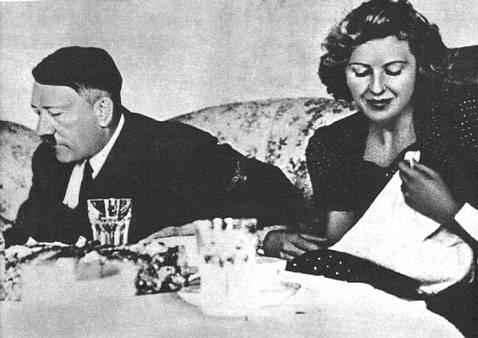
April 15, 1945: Eva Braun moves into the Führerbunker.
April 15, 1945 Stalin to Churchill:
In President Roosevelt the Soviet People saw a distinguished statesman and an unswerving champion of close cooperation between the three states. The friendly attitude of President Franklin Roosevelt to the USSR will always be most highly valued and remembered by the Soviet people. So far as I personally am concerned I feel exceptionally deeply the burden of loss of this great man, who was our mutual friend. (Churchill)
April 15, 1945 Eden (Washington) to Churchill:
The Ambassador and I had a talk with Stettinius shortly after my arrival this morning. Stettinius said that both Stalin and Molotov had shown signs of being deeply moved by the Presidents death. Stalin asked Harriman whether there was any contribution he could make at a moment like this to assist to promote the unity of the great Allies. Stettinius said that unfortunately Harriman had not at once replied Poland, but instead had suggested that it would be a good thing if Molotov could come to San Francisco for the Conference. Stettinius had seized on this, and telegraphed urging not only that Molotov should come to San Francisco, but also he should come to Washington first for conversations. An hour ago Stettinius rang me up to say that the Russians had agreed to this course and that Molotov was coming by American aircraft which had been sent to bring him. I suppose therefore that he will be here by Tuesday, when I plan that we should embark upon the Polish issue. (Churchill)
April 15, 1945 Churchill to Truman:
I have just read the draft joint message which you propose we should send to Stalin. In principle I am in complete agreement with its terms. I strongly agree with you that our reply is of high urgency. Moreover, it is important to strike the note of our unity of outlook and of action at the earliest moment. (Churchill)
April 16, 1945 Halifax (Washington) to Churchill:
Anthony and I saw Harry Hopkins this morning. He had not been greatly surprised by the Presidents death, and was thankful he had not had a stroke and lost power like Wilson. For some time he had noticed how much the President had failed. He had been able to do only very little work. He judged the President's death to have created a completely new situation in which we should be starting from scratch. One thing we would be certain of would be that the policy would be very much more the concerted action of the Senate. How this would work it was quite impossible to predict. It may be of interest that Truman's hobby is history of military strategy, of which he is reported to have read widely. (Churchill)
April 16, 1945 Eden to Churchill:
Edward and I paid our first call on the President this morning. He made a good impression. My impression from the interview is that the new President is honest and friendly. He is conscious of but not overwhelmed by his new responsibilities. His references to you could not have been warmer. I believe we shall have in him a loyal collaborator, and I am much heartened by this first conversation. (Churchill)
April 16, 1945: The Battle of the Seelow Heights begins as General Zhukov launches his final attack on Berlin. His forces soon run into trouble, and the battle just west of the River Oder proves to be no cake-walk as the Germans, under no illusions as to their probable fate under the Soviets, fight with dogged and fanatic determination. Stalin soon orders Koniev, Zhuvok's rival, to direct his armored forces directly at the Nazi capital with the result that three competing Soviet Fronts are now advancing on Berlin: 2.5 million men, 41,600 guns and mortars, 6,250 tanks and self propelled guns, over a million multiple rocket launchers, and 7,500 aircraft. In contrast, Heinrici's Army Group Vistula has 250,000 poorly armed men, 850 tanks, 500 anti-aircraft batteries doubling as artillery, and 300 aircraft with no fuel. (Clark, Read)
Marshal of the Soviet Union Georgy Konstantinovich Zhukov: I attacked along the whole front, and at night. As prisoners later told us, the great artillery barrage at night was what they had least expected. They had expected night attacks but not a general attack at night. After the artillery barrage, our tanks went into action. We had used 22,000 guns and mortars along the Oder, and 4,000 tanks were now thrown in. We also used 4,000 to 5,000 planes. During the first day alone there were 15,000 sorties.
April 16, 1945 Mikolajczryk to Churchill:
1. I consider close and lasting friendship with Russia is the keystone of future Polish policy, within the wider friendship of the United Nations.
2. To remove all doubt as to my attitude, I wish to declare that I accept the Crimea decision in regard to the future of Poland, its sovereign independent position, and the formation of a Provisional Government representative of National Unity.
3. I support the decision arrived at in the Crimea that a conference of leading personalities be called with a view to constituting a Government of National Unity, as widely and fairly representative of the Polish people as possible, and one which will command recognition by the three major Powers. (Churchill)
April 16, 1945: In his first speech to Congress, President Harry S. Truman pledges to carry out the war and peace policies of his late predecessor, President Franklin D. Roosevelt:
So that there can be no possible misunderstanding, both Germany and Japan can be certain, beyond any shadow of a doubt, that America will continue the fight for freedom until no vestige of resistance remains! We are deeply conscious of the fact that much hard fighting is still ahead of us. Having to pay such a heavy price to make complete victory certain, America will never become a party to any plan for partial victory! To settle for merely another temporary respite would surely jeopardize the future security of all the world. Our demand has been, and it remains-Unconditional Surrender!
We will not traffic with the breakers of the peace on the terms of the peace. The responsibility for making of the peace-and it is a very grave responsibility-must rest with the defenders of the peace. We are not unconscious of the dictates of humanity. We do not wish to see unnecessary or unjustified suffering. But the laws of God and of man have been violated and the guilty must not go unpunished. Nothing shall shake our determination to punish the war criminals even though we must pursue them to the ends of the earth. Lasting peace can never be secured if we permit our dangerous opponents to plot future wars with impunity at any mountain retreat - however distant. In this shrinking world, it is futile to seek safety behind geographical barriers. Real security will be found only in law
and in justice...

April 16, 1945: As the Soviets near Berlin and the Americans enter Nuremberg, Hitler addresses what is left of his forces:
The Jewish Bolshevik arch-enemy has gone over to the attack with his masses for the last time. He attempts to smash Germany and to eradicate our nation. You soldiers from the east today already know yourselves to a large extent what fate is threatening, above all, German women, girls and children. While old men and children are being murdered, women and girls are humiliated to the status of barracks prostitutes. Others are marched off to Siberia. We have anticipated this thrust, and since January of this year everything has been done to build up a strong front. Mighty artillery is meeting the enemy. Our infantry's casualties were replenished by countless new units. Reserve units, new formations and the Volkssturm reinforce our front. This time the Bolsheviks will experience Asia's old fate. That is, he must and will
bleed to death... From Speer's testimony before the IMT: It was said that military protection against the East would have been necessary to protect refugees. In reality, until the middle of April 1945, the bulk of our last reserves of armored vehicles and munitions were used for the fight against the West. The tactical principle, therefore, was different from the one it should have been if the fight had been carried out with the aims which have been stated here. The destruction of bridges in the West and the destruction orders against the basis of life of the nation show the opposite. The sacrifices which were made on both sides after January 1945 were senseless. The dead of this period will be the accusers of the man responsible for the continuation of that fight, Adolf Hitler. The same is true of the ruined cities, which in this last phase had to lose tremendous cultural values and where innumerable dwellings suffered destruction. Many of the difficulties under which the German nation is suffering today are due to the ruthless destruction of bridges, traffic installations, trucks, locomotives, and ships. The German people remained loyal to Adolf Hitler until the end. He betrayed them with intent. He tried to throw them definitely into the abyss.

April 16, 1945: The United States Army liberates the Nazi Sonderlager (high security) Prisoner of War camp Oflag IVc (Colditz Castle).
April 16, 1945 Operation Hannibal: The Goya, evacuating German soldiers and civilians, is torpedoed and sunk by L-3, with the loss of over 6,000 lives; 183 survived. (Sellwood)
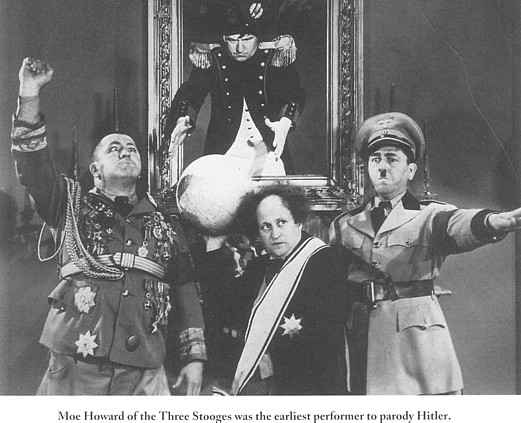 Popular Jewish-American comics as Goering, Goebbels, and Hitler.
Popular Jewish-American comics as Goering, Goebbels, and Hitler.
April 17, 1945: Reich Propaganda Minister Goebbels, at a last conference at his ministry, speaks to the assembled bureaucrats on their place in history:
Gentlemen, in a hundred years time they will be showing a fine color film describing the terrible days we are living through. Don't you want to play a part in that film?...Hold out now, so that a hundred years hence the audience does not hoot and whistle when you appear on screen. (Bullock)
April 17, 1945: In Strassfurt, Germany, US Lieutenant Colonel Boris T. Pash seizes half a ton of uranium, in an attempt to foil the Soviet Unions' plans to build an atomic bomb.
April 18, 1945 Churchill to Truman:
Your armies soon, and presently ours, may come into contact with the Soviet forces. But the moment V.E. Day has occurred we should try to set up the Allied Control Commission in Berlin and should insist upon a fair distribution of the food produced in Germany between all parts of Germany. As it stands at present the Russian occupational zone has the smallest proportion of people and grows by far the largest proportion of food, the Americans have a not very satisfactory proportion of food to conquered population, and we poor British are to take over all the ruined Ruhr and large manufacturing districts, which are, like ourselves, in normal times large importers of food.
I suggest that this tiresome question should be settled in Berlin by the Allied Control Commission before we move from the tactical positions we have at present achieved. The Russian idea of taking these immense food supplies out of the producing areas of Germany to feed themselves is very natural, but I contend that the feeding of the German population must be treated as a whole and that the supplies must be divided pro rata between the occupational zones. I should be most grateful if you would let me have your views on these points, which, from the information I receive from many sources, are of the highest consequence and urgency." (Churchill)
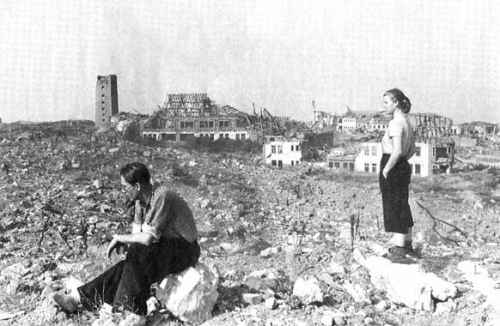
April 18, 1945: Over 1,000 Allied bombers attack the teeny little island of Heligoland, Germany, leaving nothing standing. The remaining German forces in the Ruhr pocket surrender. Himmler names Kaltenbrunner Commander in Chief of all German forces remaining in southern Europe.
April 19, 1945 Churchill to Eden:
This is for your eyes only. It would seem that the Western Allies are not immediately in a position to force their way into Berlin. The Russians have two and a half million troops on the section of the front opposite that city. The Americans have only their spearheads, say twenty-five divisions, which are covering an immense front and are at many points engaged with the Germans. There is no reason why the Russians should occupy Denmark, which is a country to be liberated and to have its sovereignty restored. Our position at Luebeck, if we get it, would be decisive in this matter. Thereafter, but partly concurrent, it is thought well to push on to Linz to meet the Russians there, and also by an American encircling movement to gain the region south of Stuttgart. In this region are the main German installations connected with their atomic research, and we had better get hold of these in the interest of the special secrecy attaching to this topic. (Churchill)
April 19, 1945: Joseph Goebbels delivers his last Hitler's Birthday Eve speech:
At the moment of the war when—so it seems—all forces of hate and destruction have been gathered once again, perhaps for the final time, in the west, the east, the southeast and the south, seeking to break through our front and give the death blow to the Reich, I once again speak to the German people on the eve of 20 April about the Fuehrer, just as I have done every year since 1933. That has happened at good and bad times in the past. But never before did things stand on such a knife's edge, never before did the German people have to defend their very lives under such enormous danger, never before did the Reich have to draw on its last strength to protect its threatened self. Times such as these are
rare in history...
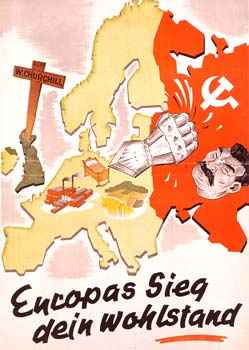
From The Unseen War in Europe, by John H. Waller: Goebbels, propagandist to the end, delivered a flaming speech on April 19, (on the eve of) Hitler's birthday, threatening a terrible 'flood of bolshevism,' in a desperate attempt to cause the Western powers to turn on their Soviet Allies. Goebbels's biographer Ralf Georg Reuth thinks that unlike Himmler, who looked westward, Goebbels believed that Stalin was 'more realistic than the English-American runners amok' and 'it was more likely that something could be accomplished in the East.'
While Goebbels's ranting made no impression on the Western Allies, it probably served once more to rattle Stalin, who could not be dissuaded from his conviction that the West would make a separate peace with the Nazis and join forces with the German Army against the USSR. Soviet intelligence had been well aware of General Wolff's negotiations with Dulles all along and knew that Himmler and Schellenberg in the end were trying desperately to make a deal with the West through Bernadotte's good offices. Ribbentrop too had sent out probes to the West through Stockholm. In newly occupied Vienna Soviet loudspeakers shrieked warnings of the coming 'greatest betrayal in world history,' in which the capitalist powers would join the Nazis in a struggle against democracy. The Austrian people were exhorted by the Russians to 'come over to us.'
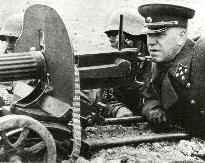
April 20, 1945: Marshal Ivan Konev's 1st Ukrainian Front breaks through the last formations of Army Group Center. Soviet tanks reach the outskirts of Berlin. Marshal Georgy Zhukov's 1st Belorussian Front begins shelling Berlin's Zentrum. German defences, most of which are commanded by Helmuth Weidling, consist only of a couple of depleted and poorly equipped Wehrmacht and Waffen-SS divisions, supplemented by Volkssturm and Hitler Youth members. Meanwhile, US troops capture Leipzig, Germany, but will later have to hand the city over to the Soviets.
From Nazi propagandist Hans Fritzsche's testimony before the IMT: ...the most impressive false news of which I was a victim was given out in the last few days of the war. I must describe it for the sake of clearing up matters. In the days when Berlin was surrounded by the Russian Army the people of Berlin were told that a relief army, the army of General Wenck, was marching on Berlin; that there was no more fighting on the Western Front. The news was given out that Ribbentrop had gone to the Western Front and had concluded a treaty there, and handbills were printed in Berlin which contained approximately this text: "Soldiers of the Wenck army, we Berliners know that you are as far as Potsdam. Hurry, come quickly, help us." These handbills were printed at a time when the Wenck army no longer existed and had already been captured. These handbills were apparently dropped over Berlin inadvertently and were to give the inhabitants of Berlin new courage. That happened in the days when Hitler, according to Speer's testimony, had already told his entourage that there was no use trying to do anything for the rest of the German people.
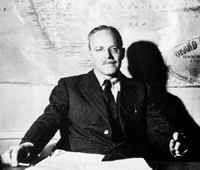
April 20, 1945: OSS chief Allen Dulles is ordered by the US Joint Chiefs of Staff to cut off any further negotiations with German emissaries. (Waller)
April 20, 1945: Before leaving for Hitler's birthday get-together at the Fuehrerbunker, Speer gives his final instructions to Theodor Hupfauer, his right-hand man. Hupfauer will later tell Gitta Sereny:
He handed me a letter with precise instructions. It said—and he repeated all this when we talked—that Hitler had not made the final decision whether to stay in Berlin or go north or south, but that whichever it was, Speer would stay with him. If Hitler—and Speer—went north, I was to stay in the south; if Hitler and Speer came south, I was to somehow make my way north. Anyway, I was to take over wherever Speer would not be. One thing is certain, though; Speer was sure he would be needed by the Allies. I said, 'For heaven's sake, we are going toward complete annihilation; nobody will want any of us.' But Speer said, 'Yes, they will need me. They will need my knowledge.' (Sereny)
April 20, 1945: Hitler celebrates his 56th birthday in his Berlin bunker. With the Russians at the gates of Berlin, the increasingly deranged dictator receives the murmured birthday greetings of his entourage with a limp handshake and a vacant expression. Present to wish their Fuehrer well are Goering, Goebbels, Himmler, Speer, Doenitz, Ribbentrop, Keitel, Kaltenbrunner, and various generals. After breakfast—in late afternoon—Hitler makes his last trip to the surface in order to award Iron Crosses to some 20 'soldiers' of the Hitler Youth who had distinguished themselves in combat. Hitler mutters a few words to the teenagers, pats a few on the cheek, and within minutes makes his way haltingly back to his Bunker. (Shirer, Read)
April 21, 1945: The last Western air raid strikes Berlin. After the raid, Eva Braun, the secretaries and the other support staff go above ground to the ruins of the Chancellery for a sort of midnight birthday party in honor of the already retired Fuehrer. A wind-up phonograph is located, but only one surviving record can be found to play on it: 'Red Roses Bring You Happiness.' With the rumble of Soviet artillery in the air, the party gets underway as the celebrants drink champagne to excess and repeatedly dance to that single solitary song. When the phone rings and then an artillery shell explodes nearby, the rest of the party also heads back into the safety of the Fuehrerbunker. Traudl Junge will later tell Gitta Sereny:
Everybody came, even Bormann and Dr. Morell. We drank champagne and danced to the accompaniment of a single record somebody had brought. People laughed hysterically. It was horrible; soon I couldn't stand it and went back down, to bed. (Read, Sereny)
April 21, 1945: While Hitler's entourage parties in Berlin, Himmler meets with a representative of the World Jewish Conference, Norbert Mauser. After a long discussion stretching into the wee hours of the morning, Himmler makes many concessions. He promises that no more Jews will be killed, all the camps will be handed over intact to the Allies, and the 15,000 women prisoners of Ravensbrueck will be released to the Red Cross. (Read)
April 21, 1945: Annemarie Kemp visits Magda Goebbels at her home. She will later tell Gitta Sereny:
I really think that for most of us the worst shock was to learn that Goebbels intended for his wife and their six children to die with him in the Bunker. It seemed just totally unreal, impossible. Speer said that he wouldn't have it. So a few days before Goebbels moved them all into the Bunker, he sent me to see Magda Goebbels, at her country residence near Berlin. He had been there the day before and had failed to persuade her. He thought that speaking to her as a woman I might have a better chance. He had worked out a way of getting her and the children out of Berlin by water. He had a houseboat prepared for them, quite a substantial craft, fully crewed and standing ready near the landing stage of their house on the river, in Schwanenwerder. It could have taken them off right there from their own dock. The pilot's orders were that, traveling in the night with Frau Goebbels and the children hidden below deck, he was to take it up to a tributary on the western side of the Elbe. There were enough supplies to keep them safe there if necessary for several weeks. But Frau Goebbels said no. One knew she would; one knew her closeness to Hitler. Many people thought she had always been in love with him, though Speer didn't. He had got to know her very well during her passionate love affair with Hanke; he was her confident then, as he was and would be to the end for Eva Braun. That always surprised me. I could never imagine what they found to talk about.
Magda Goebbels was a different matter. She really was an extraordinary woman, you know, very beautiful, very much of a 'lady,' at the same time an experienced woman of the world. There weren't that many around. Speer liked her a lot and I did too. I always knew she'd say no to me as she did to Speer, but the children - it was intolerable, unbearable. One had at least to try. The children came in, to say hello. I cannot tell you what nice children they were; five girls and a boy, all their names—ridiculous—starting with H. The oldest, Helga, a grave sort of child, I thought she was twelve. The boy, Helmuth, ten, seemed very shy to me, almost withdrawn. The youngest was Heidi, five, a real funny bunny. They were brought up to be very polite, you know; the girls curtsied; Helmuth bowed, rather stiffly. All firmly shook my hand and looked me straight in the eye. Except Heidi—she sort of patted my hand as she whirled by, and then made a funny production of curtsying, a sort of deep though a bit wobbly court reverence, holding her skirt out at each end; and then laughing fit to burst, with everybody laughing with her, boomps, before I could think, there she was, on my lap with her arms around me. She was just an enchanting child...How in the world was I going to talk to their mother about not killing her children? (Sereny)

April 21, 1945: Goering cleans out his vast Prussian estate, Karinhall (or, variously, Carinhall). He loads up twenty trucks and cars with files, equipment, and his remaining riches (he'd already sent off two trainloads full). Next, he calls his four pet bison to him by name and kills them with his hunting rifle, leaving instructions that the meat be distributed to the endless columns of refugees streaming away from the Soviet advance. After spending some time in the mausoleum on the grounds that hold the remains of his beloved first wife (a Swedish baroness), he leaves at the head of the line of vehicles after pushing the plunger himself and blowing Karinhall to bits. Parking the convoy in front of Luftwaffe headquarters at Werder, he drives on to the days situation conference at the Fuehrerbunker. (Read)
April 21, 1945: Before the daily situation conference, Goering takes Keitel aside and pleads with him to talk Hitler into leaving Berlin for Berchtesgaden while there is still an open road. For the last ten days, all non-vital personnel have been transported to the Berchtesgaden area (the so-called Alpine Redoubt), and a fleet of planes is standing by to evacuate the big shots. Keitel will later relate that he agreed to talk to Hitler because 'my own absolutely firm belief at that time (was) that the Fuehrer and the OKW staff would...also be transferring their supreme command to Berchtesgaden.' Keitel is joined by other generals in urging the Fuehrer to abandon Berlin, but he resists the idea, saying only: 'I leave it to fate whether I die in the capital or fly to Obersalzberg at the last moment.' (Read)
April 21, 1945: Hitler appoints Doenitz (a naval officer) commander of German ground forces in the North, and appoints Kesselring (an air officer) as commander of German ground forces in the South. General der Artillerie Helmut Wielding becomes commander of the LEVI Panzer Corps. Hitler gives further orders that German army formations under SS General Felix Steiner (above) are to immediately counter attack and disrupt the two massive Soviet pincers encircling Berlin. Steiner tries to explain to his superiors that the only offensive capability he has is two battalions of the 4th SS Police Division without any combat weapons. At this point, however, no one has the nerve to present bad news to the erratic Fuehrer, and Steiner's factual concerns are never passed up the chain of command to Hitler, who actually believes he has issued a sane and actionable command. (Clark, Read)
April 21, 1945: Before leaving the Fuehrerbunker, Goering takes Himmler aside and urges him to extend peace feelers to the West. Himmler mockingly informs him of his negotiations with Swedish Red Cross envoy Bernadotte and tells him that he is meeting with him again in the evening. He tauntingly tells Goering; 'You know, he must be the man sent by Eisenhower to negotiate,' but Goering responds coolly; 'Don't take offense, but I doubt that they'll find YOU acceptable as a negotiating partner.' 'Sorry to contradict you,' the smug SS leader replies, 'But I have incontrovertible proof that I am considered abroad to be the only person capable of maintaining order.'
Before Goering can find the words to respond to this ridiculous contention, Himmler asks him whether or not he will appoint him as Chancellor should Hitler meet his demise. Goering says that that is impossible, as the office of Chancellor is not a separate office, but bound up in the office of the Fuehrer. Himmler pushes on, perhaps in an attempt to get his rival to lose his temper: 'Herr Reich Marshal,' Himmler needles, 'if anything should prevent you from succeeding the Fuehrer—say you are eliminated—can I have the position?' Goering keeps his cool: 'My dear Himmler, we shall have to wait and see. That will depend upon circumstances. I can't for the life of me see what might prevent me from taking up office.' (Read)
April 21, 1945 Eden (Washington) to Churchill:
I strongly share the view that Montgomery should take Luebeck. A Russian occupation of Denmark would cause us much embarrassment. The fears of Scandinavian countries would be greatly increased, and I seem to remember that one of the causes of dissension between the Russians and the Germans in their honeymoon period in 1940 arose out of certain Russian demands for control of the Kattegat. I am sure that you still have Prague in mind. It might do the Russians much good if the Americans were to occupy the Czech capital, when no doubt they would be willing to invite the Soviet Ambassador to join the United States and ourselves, in contrast to the behavior the Russians have shown to us. (Churchill)
April 21, 1945: As the last decisive break-throughs of the Russians into Berlin continue, Goebbels opines that his own support of the war—through his effective use of propaganda—is in no way responsible for the current catastrophe:
After all, the German people did not want it otherwise. The German people by a great majority decided through a plebiscite on the withdrawal from the League of Nations and against a policy of yielding and chose, instead, a policy of courage and honor; thereby the German people themselves chose the war which they have now lost.
From Fritzsche's testimony before the IMT: These were the last words (above) which I heard from Dr. Goebbels and these words are untrue. I declare under oath: Dr. Goebbels had never previously given such significance to that plebiscite. Never had he given it that interpretation. The exact opposite was the case. At the time of this plebiscite, the German people were explicitly given once again a solemn assurance of the will for peace on the part of Hitler and his associates. Therefore, I am convinced that Hitler and at least some of his colleagues had deliberately lied to the people on decisive points, right from the beginning of their political career; and, something that is not so important to history, I personally felt deceived on these points, too.
April 21, 1945: Speer records a speech at the broadcasting station at Hamburg. The recording officials, however, demand that this speech should be broadcast only after Hitler's death, which will relieve them of their oath of allegiance to him. The speech, which will never be broadcast, urges that the scorched earth policies not be implemented. (Shirer)
From Speer's testimony before the IMT: The State Secretary of the Propaganda Ministry made it possible for me on 9 April to speak briefly over the entire German radio system. All preparations were made, but at the last moment Goebbels heard about it and demanded that Hitler should approve the text of my speech. I submitted to him a very modified text. But he forbade even this very modified text.
On 21 April 1945 it was possible for me first of all to record a speech at the broadcasting station at Hamburg. This was to be broadcast as the instructions for the final phase. The recording officials, however, demanded that this speech should be broadcast only after Hitler's death, which would relieve them of their oath of allegiance to him.
Furthermore, I was in contact with the chief of staff of an army group in the East, the Army Group Vistula. We were both agreed that a fight for Berlin must not take place and that, contrary to their orders, the armies should by-pass Berlin. To begin with, this order was carried out; but later several persons empowered with special authority by Hitler were sent outside Berlin and succeeded in leading some divisions into Berlin. The original intention however that entire armies should be led into Berlin was thus not carried through. We expected that the war would last longer, for Churchill, too, prophesied at the time that the end of the war would come at the end of July 1945.

April 21, 1945 Death: Field Marshal Walter Model (AKA the 'Fuehrer's Fireman') learns that the USSR has indicted him for the deaths of 577,000 people in concentration camps in Latvia, the deportation of 175,000 others as slave labor, and other war crimes. Model tells his staffers: "Has everything been done to justify our actions in the light of history? What can there be left for a commander in defeat? In antiquity they took poison". After his attempts to seek death on the front line do not succeed, he commits suicide this day by shooting himself in the head. (Newton)
April 21, 1945: Soviet forces south of Berlin at Zossen attack the German High Command headquarters. Meanwhile, the last of the German troops pull out of Bologna, Italy. Reich Labor Leader Robert Ley takes his final leave of the Führerbunker.
April 22, 1945: After leaving his all night meeting with Mauser at 5 AM and traveling for many hours, Himmler meets again with Swedish Red Cross envoy Bernadotte, but is too tired and stressed out to engage in meaningful negotiations. He leaves his underlings to continue the negotiations, but without the Reichsfuehrer SS's participation nothing can be settled, and the unproductive meeting is concluded with no progress being made. (Read)
April 22, 1945: Fewer than 1,000 of Bosnia's 14,000 Jews are still alive at the concentration camp of Jasenovac, near Zagreb. 600 prisoners, Jews and non-Jews, rise up in revolt. 520 are killed, and only 80 escape, including 20 Jews. Meanwhile, Wilhelm Cauer, German mathematician most noted for his work on the analysis and synthesis of electronic filters—a civilian and not a member of the Nazi Party—is executed by Red Army soldiers in Berlin.
April 22, 1945: German General der Artillerie Helmuth Weidling, due to a misunderstanding concerning a retreat order, is sentenced to be executed by firing squad.
April 22, 1945: Goebbels publishes his last article in Das Reich:
The war has reached a stage at which only the full efforts of the nation and of each individual can save us. The defence of our freedom no longer depends on the army fighting at the front. Each civilian, each man and woman and boy and girl must fight with unequaled fanaticism. The enemy expects that, once his tanks have broken through, they will find no resistance. He believes that we will be so disconcerted by his material superiority that we will let things take their course, without caring how they turn out. We must prove the enemy's hopes wrong. No village and no city may give in to the enemy. The enemy is strong, but not strong enough to hold all the territory of the Reich
without our help...
April 22, 1945: At 11:30 AM, the Red Air Force (the RAF and Americans have already made their last attacks on Berlin, leaving the Soviets to deal with the Nazi capital unencumbered) and Red Army artillery begins a fierce bombardment of Berlin's city center (the Zentrum), with shells and bombs falling at a rate of one every 5 seconds. The Brandenburg Gate is hit and the Reichstag and old Royal Palace catch fire. Heavy explosions rock the Fuehrerbunker, causing Hitler to experience flashbacks to his WW1 days in the trenches. Hitler never does recover from the unnerving barrage, and issues frantic and contradictory orders throughout the day. He furiously calls Koller, demanding why there is no air cover. When the Luftwaffe officer replies that there is no fuel for the jets, Hitler explodes: 'Then we don't need the jets anymore! The Luftwaffe is superfluous. The entire Luftwaffe leadership should be hanged immediately!'
After slamming down the phone and steaming for awhile, he calls poor Koller back and demands that he round up all Luftwaffe personnel—including Goering's paratroops in his personal bodyguard—and muster them for inclusion in new 'combat formations.' The hard-pressed Koller—working through the night—manages to assemble nearly a division's worth; 12 - 15,000 untrained and unarmed ground staff. When he later somewhat fearfully relates the results of his recruitment effort, Hitler responds with a surprising amount of optimism: 'You will see, the Russians will suffer the greatest defeat, the bloodiest defeat in their history, at the gates of Berlin.' (Read)
April 22, 1945: Hitler calls together the female inhabitants of the Fuehrerbunker, ostensibly for an early afternoon lunch. Hitler's cook, Constanze Manzialy, serves the group strong coffee until Hitler arrives. Traudl Junge will later tell Gitta Sereny: "Constanze took the food off the burners. We had a terrible premonition, all of us at the same time... Hitler looked terrible: white, thin, old... We had expected it, but now that it came, we were struck dumb." As expected, Hitler tells them that the time has come for them to leave the Fuehrerbunker. Eva Braun walks over to Hitler, takes his hands in hers and tells him that she would never leave him.
Traudl Junge: "He looked at her and then, ignoring us, kissed her fully on the lips. It was the first and only time we saw him touch her like this... When he then ordered us to go, we both together (Junge and Gerda Christian) said, 'Nein.' Manzialy and Elsa Krueger likewise protest being forced to leave their Fuehrer. Jung: "He got hold of my hand with one of his, and Gerta and Constanze's with the other and held them tightly, and then he said, 'If only our generals had been as brave as you.'... Linge stayed, and so did Hitler's chauffeur, Kempa, three orderlies, the kitchen staff and telephone operators." Karl Gebhardt, Christa Schroeder, and Johanna Wolf take their final leave of the Fuehrerbunker. (Sereny)
April 22, 1945: From Benito Mussolini's Political Testament (Cited in Edgar Meyer and Thomas Mehner's 'Hitler und die Bombe: Welchen Stand erreichte die deutsche Atomforschung und Geheimwaffenentwicklung wirklich.'):
The well-known mass destruction bombs are nearly ready. In only a few days, with the utmost meticulous intelligence, Hitler will probably execute this fearful blow, because he will have full confidence.... It appear, that there are three bombs - and each has an astonishing operation. The construction of each unit is fearfully complex and of a lengthy time of completion.
April 22, 1945: Speer decides to return to Berlin in order to say goodbye to his Fuehrer. Annemarie Kemp will later tell Gitta Sereny:
When he arrived in Hamburg the previous day, apparently so relieved to be with us, I thought that now at least he was out of Bormann's clutches—after all, Hitler had told him that night of March 29 that Bormann had told him all about Speer's 'treasonable conduct.' And now this. He said something about wanting to get Brandt out, but I thought it was a pretext. I didn't really know why he wanted to go back, but I was sure it wasn't Wagnerian dramatics... Well, yes it did occur to me that perhaps he had a death wish. Anyway, I was dreadfully sure he wouldn't get back.
Speer gives his two adjutants, Siebert and Poser, the choice of whether or not to accompany him to Berlin. Siebert will later tell Gitta Sereny: Frankly, I didn't want to go. It was madness. I said, 'Minister, my rank is too modest for such a responsible assignment.' One could say that sort of thing to him and be understood." Speer also tells Poser that it is up to him whether he accompanies him or not: Poser decides to go along. He will later tell Gitta Sereny:
But I said I was his liaison officer, and it was my job to go with him wherever he went. Later on that day, I can't remember exactly where, he told me that he wanted to say goodbye to Hitler. He said, 'However funny that sounds, just because we've had so many conflicts since March, I feel I must see him again, even if it means that in the end I can't get out.' (Sereny)
April 23, 1945: Hitler wakes in a foul mood. When his quack doctor, Theodor Morell, offers to give him an injection of morphine to calm his nerves, the paranoid Fuehrer accuses him of attempting to knock him out so that he can be transported to Berchtesgaden against his will, and abruptly dismisses him. (Read)
April 23, 1945: By the afternoon situation conference (3 PM), Hitler shows all the signs of a man going through drug withdrawal. For the first time in many months, he is without his daily dose of an amphetamine cocktail that is usually administered by his just dismissed 'doctor.' After learning that Soviet forces have taken Eberswalde without a fight, and that Steiner has refused to give the order for a futile counterattack north of the city, Hitler listens in silence.
Then, in an episode some historians will describe as a nervous breakdown, Hitler suddenly leaps up and, while flushed in the face and trembling violently, sputteringly rants and raves against them all, declaring that they are guilty of every evil attribute from cowardice to incompetence. 'The war is lost,' he screams. 'Everything is falling apart.' He states that suicide is now his only recourse: 'Alive or dead,' he declares, 'I shall not fall into the hands of the enemy. I can no longer fight on the battlefield; I'm not strong enough. I shall shoot myself.' He then slumps into his seat and begins to sob: 'The war is lost. I shall shoot myself.' (Read)
April 23, 1945: For a full five minutes after Hitler declares that he shall stay in Berlin and commit suicide, no one in the Bunker speaks. Then, with the encouragement of the others, Jodl—in an attempt to salvage at least some of his Fuehrer's until-now-unbounded confidence—makes a proposal. He suggests that the German Twelfth Army under General Walther Wenck, now facing the Americans, should move to Berlin. He proposes that this can now be done because the Americans, already on the Elbe River, are unlikely to move further east any time soon. Hitler immediately grasps the straw Jodl presents and orders Wenck to disengage from the Americans and move the Twelfth Army north-east to support Berlin. He later gives further orders that Twelfth Army should attempt a link-up with Ninth Army.
At some point, Hitler orders Bormann, Keitel and Jodl to fly to Berchtesgaden. All three refuse. Keitel, in Jodl's presence, declares: 'In seven years I have never refused to carry out an order from you, but this is one order I shall never carry out. You cannot and should not leave the Wehrmacht in the lurch at a time like this.' 'I am staying here,' Hitler stubbornly replies, 'and that is that. Goering can take over the leadership down there. If there has to be any negotiating with the enemy, as there has to be now, then Goering is better at that then I am. Either I fight and win the Battle of Berlin of Berlin - or I am killed in Berlin. That is my final and irrevocable decision." (Clark, Read, Keitel)
April 23, 1945: After Hitler's tantrum, the telephone lines from Berlin to what is left of the Reich buzz with the news. Reich Foreign Minister Joachim von Ribbentrop, upon hearing of his Fuehrer's breakdown, calls to buck him up, promising a great diplomatic breakthrough to win the day. Himmler calls and makes an impassioned plea for him to not give up hope. After replacing the receiver he mutters, 'They're all mad in Berlin. What am I to do?'
The one thing he does not do is go the Fuehrerbunker himself. Instead, he sends Dr. Gebhart to offer Hitler the services of Himmler's own 600 man SS escort squad. He then sends Schellenberg to Luebeck to meet with unofficial back channel Red Cross envoy Bernadotte. Schellenberg is instructed to officially request—in Reichsfuehrer SS Himmler's name—that Bernadotte approach Eisenhower with an immediate offer of surrender in the West (but, of course, not in the East).
Note: This a very dangerous move by Himmler. Had he put out this feeler with Hitler's approval, it would have been merely a cynical ploy to cause dissention among the Allies. Were it handled right and cleverly leaked, it might have done much to further distrust between the two, either way the 'negotiations' go. But his doing this behind Hitler's back is clearly treason, and will give said Allies the opportunity to turn the tables, and sow dissention in the Nazi ranks. (Read)
April 23, 1945: In Berchtesgaden, Goering hears the news of Hitler's breakdown from a phone call from Koller. He orders Koller to join him at Obersalzberg. Upon arriving, Koller tells Goering of Hitler's resolve to stay in Berlin, as well as of and his statement that Goering would be a better choice to take over leadership in the south and direct negotiations with the enemy. Goering remarks that Hitler has played a 'mean trick' on him and put him in a very difficult position. Koller will later write an account of the meeting: 'Then he asked me whether I thought that Hitler was still alive or whether he had, perhaps, appointed Martin Bormann as his successor. I told him Hitler was alive when I left Berlin.' Koller urges him to seize the moment, but Goering is wary. 'Bormann is my deadly enemy,' Goering explains. 'He is only waiting to get at me. If I act, he will call me a traitor. If I don't, he will accuse me of having failed at the most difficult hour.'
The Fuehrer decree concerning Hitler's successor is located and read aloud: "Should I have my freedom of action curtailed or be otherwise incapacitated, Reich Marshal Hermann Goering is to be my deputy and successor in all offices of State, Party, and Wehrmacht." The State Secretary of the Reich Chancellery is reached on the phone (remarkably, the telephone system will continue to function through most of the Battle for Berlin) for a legal opinion; Lammers: "The law of 29 June 1941 is valid and legally binding. The Fuehrer has made no other order. If he had, I would have known. He could not have changed the decree legally without me." Koller suggests that Goering send a message to Hitler seeking his approval. Keeping Lammers on the line, the three of them draft a carefully worded message to their Fuehrer. (Read)
April 23, 1945 Goering sends a message to Hitler:
My Fuehrer, Since you are determined to remain at your post in Fortress Berlin, do you agree that I, as your deputy in accordance with your decree of 29.6.41, assume immediately total leadership of the Reich with complete freedom of action at home and abroad? If by 2200 hours no answer is forthcoming, I shall assume that you have been deprived of your freedom of action. I will then consider the terms of your decree to have come into force and act accordingly for the good of the people and the Fatherland. You must realize what I fell for you in these most difficult hours of my life, and I am quite unable to find words to express it. God bless you and that you may come here (to Berchtesgaden) after all as soon as possible. Your most loyal Herman Goering.
April 23, 1945: Hitler takes lunch with Eva Braun and his secretaries, and the conversation turns to suicide. Hitler states that the best way is to put a gun in your mouth and pull the trigger: "The skull is shattered and death is instantaneous." Eva Braun is horrified, and protests that she has been counting on leaving a beautiful corpse behind. She suggests cyanide, and Hitler concurs. Traudl Jung will later tell Gitta Sereny: "So Gerta Christian and I asked whether he would give us each one of the cyanide pills Himmler had brought. And after lunch he came and handed us each one of them. He said he was sorry he couldn't offer us a better farewell present." (Sereny)
April 23, 1945: While the other paladin's are fleeing the Nazi capital, Goebbels' family moves into the Bunker. Two limousines arrive at the Bunker just after lunch carrying Magda Goebbels and her six small children, each holding the one toy apiece that they have been allowed to bring with them. Goebbels himself already inhabits the small room next to his Fuehrer's in the lower level Bunker, so Magda and the children move into the four small rooms in the upper level just vacated by Dr. Morell. The Goebbels' children are quite fond of their 'Uncle Adolf' and look on the whole process as an exciting adventure. Goebbels had earlier confided to Speer: 'My wife and family are not to survive me. The Americans would only coach them to make propaganda against me.' Hitler's secretary, Traudl Junge, later leads the children up to the ruined Chancellery to raid the stash of birthday presents recently given to Hitler in search of additional playthings. Jung will later tell Sereny: "We knew their parents were going to kill them. Of course, they didn't know. One of them told an orderly who played with them that they were all going to have an injection so they wouldn't get sick. So you see, they had prepared them." (Read, Sereny)
From Speer's IMT testimony: On 23 April I flew to Berlin in order to take leave of several of my associates, and—I should like to say this quite frankly—after all that had happened, also in order to place myself at Hitler's disposal. Perhaps this will sound strange here, but the conflicting feelings I had about the action I wanted to take against him and about the way he had handled things, still did not give me any clear grounds or any clear inner conviction as to what my relations should be toward him, so I flew over to see him. I did not know whether he knew of my plans, and I did not know whether he would order me to remain in Berlin. Yet I felt that it was my duty not to run away like a coward, but to stand up to him again. It was on that day that Goering's telegram to Hitler arrived. This telegram was not to Hitler, but from Goering to Ribbentrop; it was Bormann who submitted it to him...
Hitler was unusually excited about the contents of the telegram, and said quite plainly what he thought about Goering. He said that he had known for some time that Goering had failed, that he was corrupt, and that he was a drug addict. I was extremely shaken, because I felt that if the head of the State had known this for such a long time, then it showed a lack of responsibility on his part to leave such a man in office, when the lives of countless people depended on him. It was typical of Hitler's attitude towards the entire problem, however, that he followed his statement up by saying: 'But let him negotiate the capitulation all the same'...He said (it) in an offhand manner: 'It doesn't matter anyway who does it.' He expressed all his disregard for the German nation in the way he said this.
April 23, 1945: Albert Speer, in his best selling books about the period, claimed to have been present at a remarkable number of key moments and events. This is perhaps one of the moments he actually witnessed first hand. He will later write: 'Perhaps this was Bormann's last effort to induce Hitler to fly to Berchtesgaden and take control there.' Speer then relates that Bormann—waving the printout of Goering's message in his hand—declares it proof that Goering is staging a coup d'etat. He fails to get a reaction from a still apathetic Fuehrer. However, the text of a further message from Goering addressed to Reich Foreign Minister Ribbentrop—with a copy intended for Keitel—is delivered to Bormann, who immediately reads it aloud to Hitler and Speer. (Speer, Read)
April 23, 1945: Hermann Goering's radio message to Ribbentrop: "I have asked the Fuehrer to provide me with instructions by 10 PM 23 April. If by this time it is apparent that the Fuehrer has been deprived of his freedom of action to conduct the affairs of the Reich, his decree of 29 June 1941 becomes effective, according to which I am heir to all his offices as his deputy. (If) by 12 midnight, 23 April 1945, you receive no word either from the Fuehrer or from me, you are to come to me at once by air."
April 23, 1945: From Albert Speer's later account: "'Goering is engaged in treason!' Bormann cried. 'He's already sending telegrams to members of the government and announcing that on the basis of his powers he will assume your office at twelve o'clock tonight, my Fuehrer!' ...An outburst of wild fury (from Hitler) followed, in which feelings of bitterness, helplessness, self-pity and despair mingled. With flushed face and staring eyes, Hitler ranted on as if he had forgotten the presence of his entourage: 'I've known it all along. I know that Goering is lazy. He let the air force go to pot. He was corrupt. His example made corruption in our state. Besides, he's been a drug addict for years. I've known it all along.' As suddenly as it had begun, the tantrum ends with a statement of resignation: 'Well, all right. Let Goering negotiate the surrender, it doesn't matter who does it.' He will soon change his mind again. (Speer)
April 23, 1945: At 5 PM, Goering receives a message from Bormann in Hitler's name: 'The decree of 29.6.41 only comes into effect on my specific agreement. There can be no talk of lack of freedom to act. I forbid you to take any steps in the direction you have indicated.' Goering immediately orders that a signal go out to Ribbentrop and Keitel canceling his previous message. However, just minutes later a further communication from the Fuehrerbunker . He is told that because of his long service his life is to be spared, but he must immediately resign from all his official offices, titles, and duties. Goering does so within the next half an hour. (Read)
April 23, 1945: OSS chief Allen Dulles receives an urgent phone call from Max Waibel, a Swiss intelligence officer. He will later recall the moment in his memoirs:
He had astounding news. General Wolff, his adjutant, Major Wenner, and one of Vietinghoff's high staff officers, Lt. Col. Viktor von Schweinitz, were on their way to Switzerland. They were coming to surrender...Wolff and Schweinitz were ready to go to Caserta immediately to arrange for the capitulation of all the German forces, Wehrmacht and SS, in North Italy. They proposed an immediate meeting with me in Lucerne to arrange the details of the trip to Allied headquarters. And I was under the strictest military orders to have no dealings with them! (Dulles)
April 23, 1945: Count Bernadotte, the Swedish Red Cross envoy, meets for the fourth time with the Reichsfuehrer SS. "Hitler is very probably already dead," Himmler tells him, and drafts a letter to be handed by Bernadotte to the Swedish Foreign Minister to be passed on to the Allies. (Kershaw)
April 23, 1945: SS guards execute Albrecht Haushofer and a group of antifascist prisoners, including Klaus Boenhoeffer, brother of Dietrich Boenhoeffer, outside Lehrterstrasse prison in Moabit during the battle for Berlin. Meanwhile, the Russian army liberates the Sachsenhausen and Ravensbrueck concentration camps. Julius Schaub takes his final leave of the Führerbunker.
April 23, 1945: President Truman summons Soviet Foreign Minister Molotov to the White House to express his extreme displeasure at the USSR's failure to allow free elections in Poland. When Molotov protests: 'I have never been talked to like that in my life' Truman is said to have responded, 'Carry out your agreements and you won't get talked to like that.' (Rosenman)
April 24, 1945 Churchill to Truman:
I thank you for your answer to my telegram. I agree with the preamble, but later paragraphs simply allow the Russians to order us back to the occupational zones at any point they might decide, and not necessarily with regard to the position of the fronts as a whole. It is your troops who would suffer most by this, being pushed back about a hundred and twenty miles in the center and yielding up to the unchecked Russian advance an enormous territory. And this while all questions of our spheres in Vienna or arrangements for triple occupation of Berlin remain unsettled. (Churchill)
April 24, 1945 Churchill to Stalin:
I have seen the message about Poland which the President handed to M. Molotov for transmission to you, and I have consulted the War Cabinet on account of its special importance. It is now my duty to inform you that we are all agreed in associating ourselves with the President in the aforesaid message. I earnestly hope that means will be found to compose these serious difficulties, which if they continue will darken the hour of victory. (Churchill)
April 24, 1945: Hermann Goering is officially placed under house arrest by a squad of 30 SS men. 


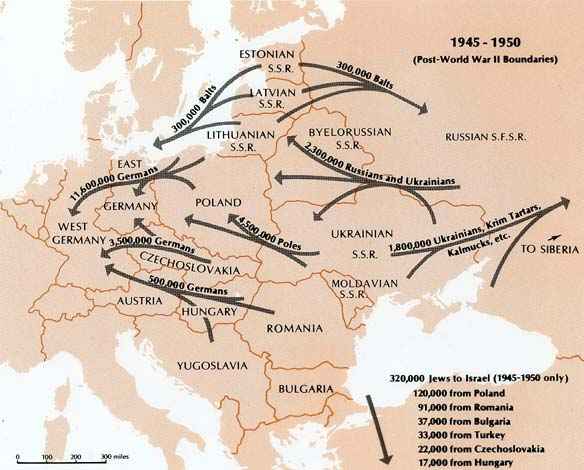
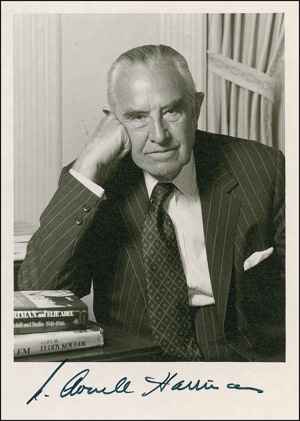
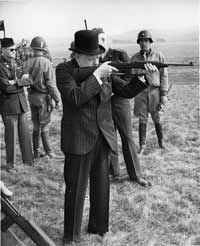
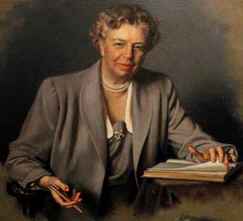
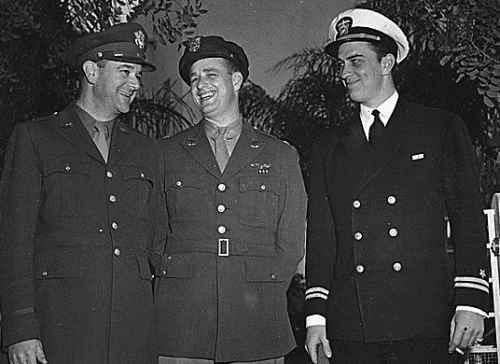

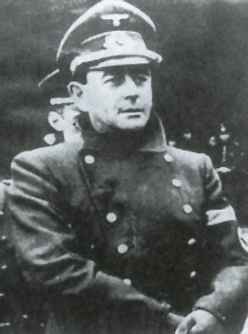






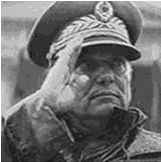


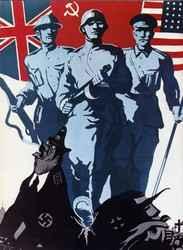









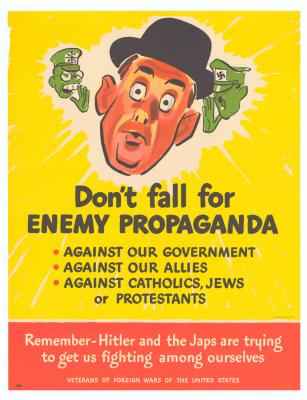







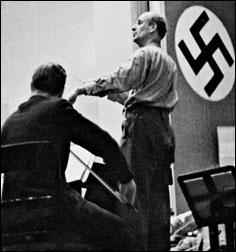
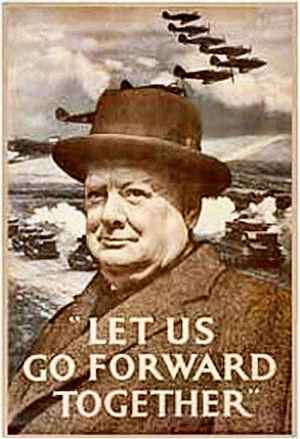
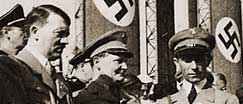




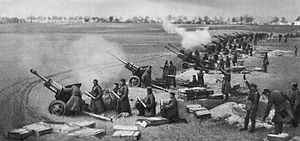
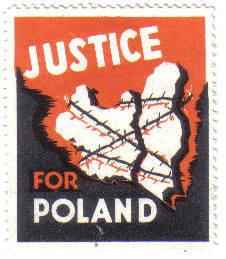




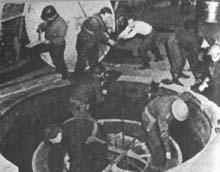





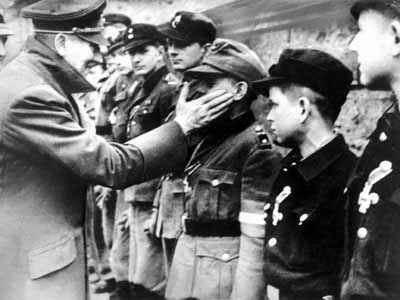



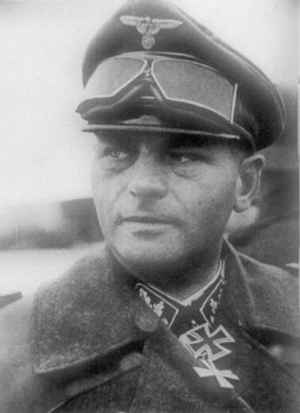
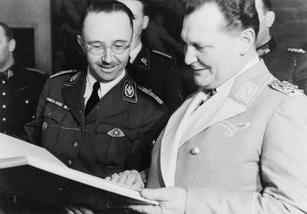
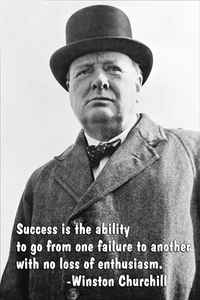

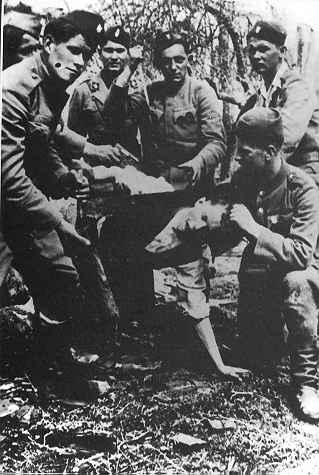
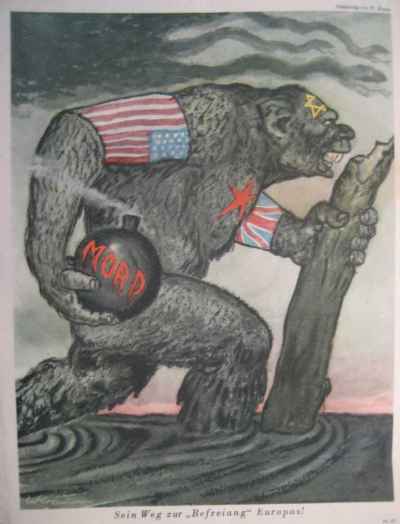
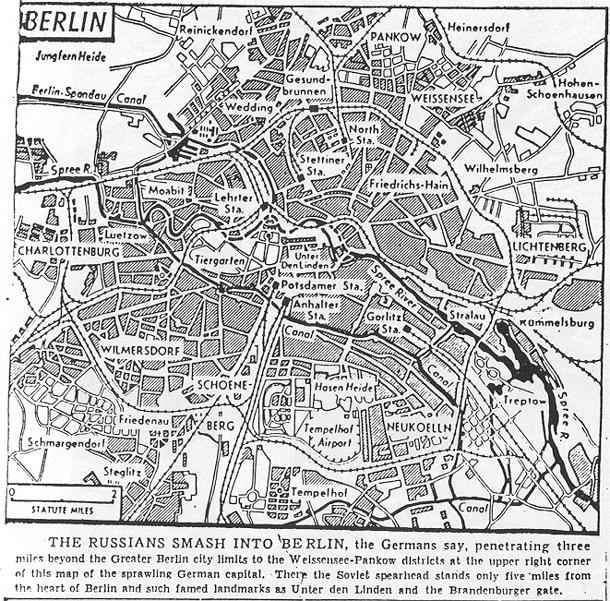
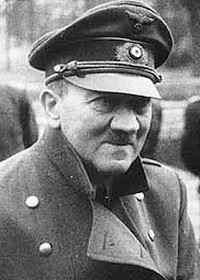

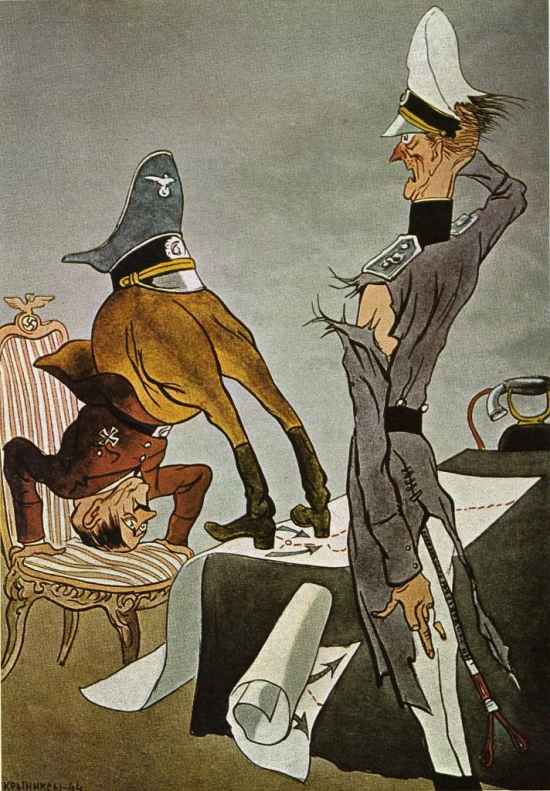





Twitter: @3rdReichStudies FB: Horrific 20th Century History




